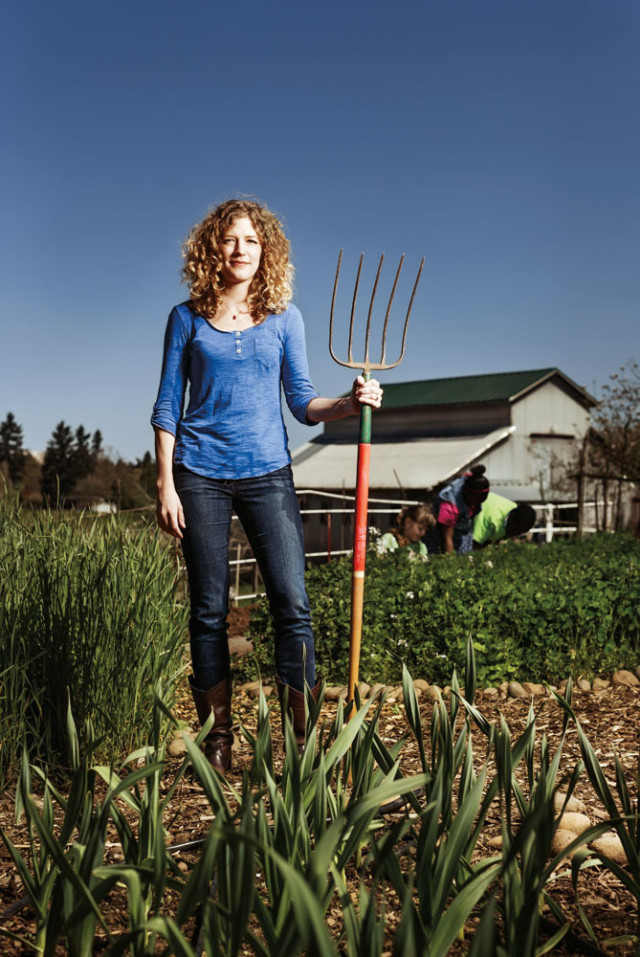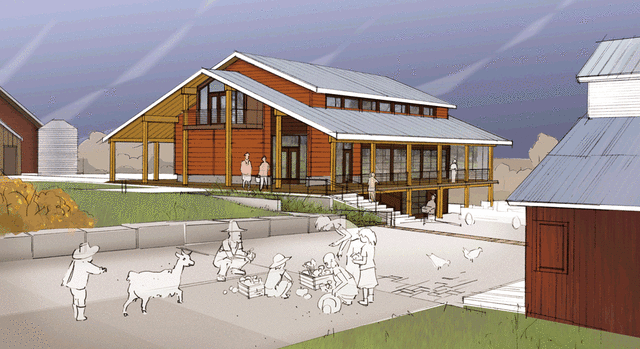Zenger Farm Grows Community Ties

"Kids' frame of reference is school and TV," says Jill Kuehler, Zenger Farm's executive director. "This is right in their backyard, and they can bring their families back."
Image: Daniel Root
Just beyond Tommy’s Too strip club, Light Truck Parts, and the Franz Bakery Outlet, but a little shy of the Birthingway College of Midwifery and the Tire Empire, a six-acre patch of idealism stands on SE Foster Road. Facing the roaring lanes of traffic with rows of raspberry vines and a leafy hedge of artichokes, the little red house and barn of Zenger Farm might seem just another vestige of outer Southeast Portland’s random urban fabric. But on any given day here, at one of the largest farms within the city limits, 60 fifth-graders might be weeding crop rows, tending chicken coops, or studying how the farm and nearby wetlands interact. Mien refugees might be tending the thickly planted garden plots they’ve maintained at Zenger for a decade. In the fall, fans of the farm’s free-range turkeys could be stopping by to pick up Thanksgiving dinner.
Day in, day out, volunteers and interns (many of whom have traveled from other states for the experience) plant, till, weed, and prune more than 100 kinds of vegetables and raise chickens and bees. But they also cultivate a broad-leafed belief that urban farming can reconnect city dwellers, particularly kids, to the outdoors, the land, and, above all, their food.
“I grew up loving a piece of land,” says a recently arrived intern, Drew Herman, a lean 27-year-old zoology grad who spent his childhood on a farm in Bethel Acres, Oklahoma, but now wants to bring his experience to the city. “But so many people have no understanding of what caring for land is. It’s a matter of food justice.”
Zenger’s numbers are impressive. More than 6,000 schoolchildren from across the metro region visit the farm every year. One thousand families take part in the farm’s “Healthy Eating on a Budget” workshops. Each Sunday, 900 shoppers routinely visit the Lents International Farmers Market, which the farm has been operating in the neighborhood since 2006.
But at age 14, Zenger Farm is a teenager outgrowing last year’s pants. “We never imagined thousands of schoolkids coming to the farm each year,” says Jill Kuehler, a tall Texan and former Peace Corps volunteer who has served as the farm’s executive director for five years. “We need to grow.”
Kuehler and the nonprofit farm’s 15-member board have launched a campaign to expand with an “Urban Grange”: 8,960 square feet of classrooms, food processing facilities, a commercial kitchen, offices, and community meeting areas. Designed pro bono by Deca Architecture, it will also stand as a beacon in an eclectic outer-east-side neighborhood with some of the lowest per capita incomes and highest levels of food insecurity in the city.
“The Urban Grange will allow us to double our programs,” Kuehler says. “But for me, a personal driver is that there are just a lack of beautiful places around here. The neighborhood doesn’t have a whole lot it can be proud of.”

Zenger Farm's proposed Urban Grange will add 8,960 square feet of classrooms, offices, meeting rooms, and event space.
Image: Courtesy Deca Architecture
Zenger Farm has deep roots, both in Southeast Portland’s longer history and in the city’s more recent farm-to-table movement. Jacob Johnson, of the family for whom Johnson Creek is named, first staked the land in the 19th century. In 1913, a Swiss dairy farmer, Ulrich Zenger, bought 40 acres and founded the Mt Scott Dairy. Five years after Zenger’s son’s death, Portland’s Bureau of Environmental Services bought the land in 1994, having long eyed its lower wetlands to soak up some of Johnson Creek’s perennial flooding. But a budding urban farmer named Mark Boucher-Colbert cut a deal with the bureau to lease two upland acres for cultivation, in trade for teaching classes in farming and ecology to schoolkids.
After working with Trauger Groh, a German biodynamic farmer whose Temple-Wilton Community Farm in New Hampshire pioneered the community-supported agriculture (CSA) model in the US during the 1980s, Boucher-Colbert brought the concept to Portland, starting the city’s first CSA, Urban Bounty, in 1993. But as he grew Urban Bounty on the Zenger land, the steady stream of wide-eyed students made him realize the farm had a bigger calling.
“The farm, the ecosystem below, and the proximity to the city seemed rare,” he recalls.
And so in 1999, he gathered 10 other community activists and leaders, from Debra Lippoldt of Growing Gardens to Nancy Steuber of OMSI. Sitting on five-gallon plastic buckets under the farm’s august fir tree, the Friends of Zenger Farm was born.
Wisteria Loeffler, now a yoga instructor, hypnotherapist, and puppeteer with Tears of Joy Theatre, steered the organization until 2007, overseeing a $700,000 campaign to turn the dilapidated farmhouse into Zenger’s headquarters, complete with innovations like a rainwater harvesting system. Over her five-year tenure, Kuehler has tripled the annual budget to $600,000, expanded the staff from two to 12, and spearheaded numerous new initiatives: the Healthy Eating on a Budget workshops; a science curriculum for all fifth-graders in the surrounding David Douglas School District; and programs for low-income families to use food stamps to buy Zenger’s CSA shares and get matching funds to shop at the Lents farmers market. In just four months, a class Zenger’s staff developed and made available as a YouTube webinar has trained more than 200 farmers nationwide on how to start similar food stamp/CSA initiatives in their communities.
“It’s a win-win,” Kuehler says. “Farmers can open a new market, and low-income shoppers can have access to the CSA model.”
Cho-chen Folwick is one of Zenger Farm’s 50 CSA members. After her son, Joseph, first discovered Zenger through one of its weeklong summer farm camps, he brought his mom to an open house. She soon joined the farm’s CSA and took a Healthy Eating on a Budget workshop. Now the 50-year-old library clerk estimates that during the summer and fall, her $25/week CSA shares provide her, her husband, and three kids 70 percent of their meals.
“When I used to shop, I only bought things that were familiar,” she says. “With the farm share and the classes, you can get out of your comfort zone. And for the kids to experience where the food actually comes from is really important.”
The urban grange is a logical and necessary next step if, for nothing else, Kuehler says with a laugh, to be able to make donor phone calls from somewhere other than the farmhouse’s one private space—the bathroom. And so far, supporters like Bob’s Red Mill, New Seasons Markets, and Bridgetown Natural Foods have agreed, ponying up $500,000 toward the $1.9 million campaign.
Beyond the farm’s annual harvest of fruits and vegetables, chicken eggs, honey, and turkeys, Zenger’s biggest bounty may its multiplier effect, small and large. At age 13, Folwick’s son Joseph says he discovered that he liked to work while pitching in on the farm. Or there’s intern Missy Kobetsky, a 23-year-old recent UC Berkeley graduate in conservation and resource studies, who told herself that “if I got this internship, it would be a sign.”
Pointing to what? Possibly a grad program to study geographic information systems. “I want to be able to map cities to find pieces of land like this that can be made into urban farms.”
Portland Monthly’s Country Brunch
A benefit for Zenger Farm’s Urban Grange
Saturday, June 22 at 11:30 a.m.
Yale Union, 800 SE 10th Ave




